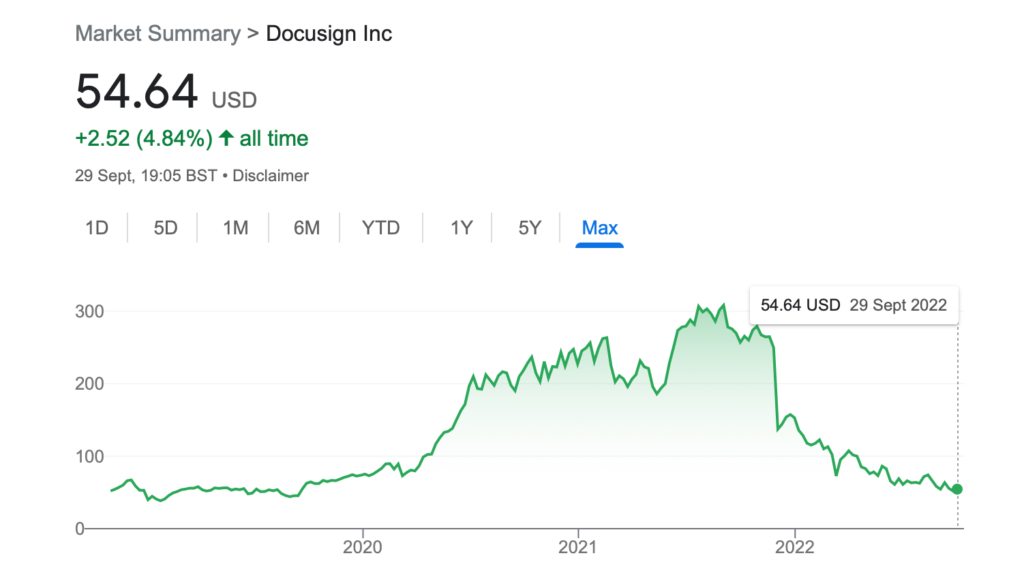
Kevin Gidney, the co-founder of Seal Software, which was bought by DocuSign, is leaving as the e-signature giant cuts 9% of its staff, about 670 people. Gidney told Artificial Lawyer: ‘I am leaving, yes. Based on a mutual separation. So I can pursue other interests.’
He added that he had wanted to leave for some time, but had not been able to reach the right terms with DocuSign, and that this restructuring had in effect made it easier to depart the company that bought Seal in 2020 – a decade after he and Ulf Zetterberg created it.
Gidney’s departure means that several of the top team have now left. Zetterberg left soon after the purchase was made and Jim Wagner, who was then VP of Agreement Cloud strategy, left in late 2021. At DocuSign Gidney (pictured above) has held the title of Vice President & Distinguished Engineer AI/ML.
Artificial Lawyer contacted several other people at DocuSign on the legal tech side of the business who said they are staying and have survived the cuts. David Silbert, Senior Director for the Agreement Cloud, and was at Seal, is staying. Jason Smith, currently Senior Director – Agreement Cloud Strategy, is staying, and only joined in January from Elevate. While, Dan Selman, CTO of Clause, the smart contract company that DocuSign bought, also said he is staying. And there may of course be others who are leaving. A spokesperson for DocuSign said they could not provide the names of those leaving.
One industry source who knows DocuSign well told this site: ‘They are still keeping the [legal tech] products that they bought. But the company’s sales and management energy are all focused now on enterprise and doing less commodity work. That is the goal.’
They also stressed that the focus on using NLP, e.g. such as via the combination of Seal with the SpringCM acquisition to provide a CLM capability for clients was staying in place. They added that there had been an increase in the use of e-signature during the pandemic, but that had dropped off now that people are moving more freely again. This may be the main cause of the cuts.
Here is the company’s latest SEC filing, which provides more information:
‘On September 26, 2022, the Board of Directors of DocuSign, Inc. authorized a restructuring plan (the “Restructuring Plan”) that is designed to improve operating margin and support the Company’s growth, scale and profitability objectives. As part of the Restructuring Plan, the Company expects it will restructure and reduce the current workforce by approximately 9%.
The Company currently estimates that it will incur charges of approximately $30 to 40 million in connection with the Restructuring Plan, consisting primarily of cash expenditures for employee transition, notice period and severance payments, employee benefits, and related costs as well as non-cash expenses related to vesting of share-based awards. The Company expects that the majority of the restructuring charges will be incurred in the third and fourth quarter of fiscal 2023, and that the execution of the Restructuring Plan will be substantially complete by the end of fiscal 2023.
Potential position eliminations in each country are subject to local law and consultation requirements, which may extend this process beyond fiscal 2023 in certain countries. The charges that we expect to incur are subject to a number of assumptions, including local law requirements in various jurisdictions, and actual expenses may differ from the estimates disclosed above.’
And below is the company’s share price. As you can see, the stock did extremely well during the pandemic, but has since dropped heavily. That also no doubt was playing on the minds of the directors.

One last point, the SEC filing said that cuts may go on well into 2023, so it’s possible there may be some more surprises. Also, there is no guarantee that once a company does cuts of such a scale that they won’t do some more if they are not getting to where they want to be, after all they said ‘approximately 9%’ – that is not a number set in stone.
To conclude, Gidney was central to Seal’s success, but like all companies after an acquisition, eventually the tech is integrated and blended into other products. As the industry source noted, the strategy is to increase enterprise work – which is very much where Seal’s tech is focused. So, longer-term and despite the instability these cuts cause, it looks like DocuSign is going to keep on with its NLP-driven CLM strategy, and perhaps even expand it.
This site wishes Gidney well in whatever he does next.